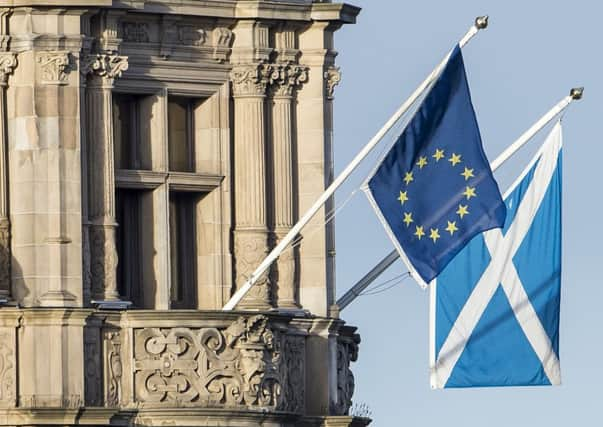John MacDonald: History can answer EU question


WHERE would a newly independent Scotland stand with the European Union? Critics attack the Scottish Government’s assertion that transition to full EU membership would be fluid and speedy. They insist Scotland would be expelled, thus requiring complex re-application.
Amid the increasingly tiresome politicking, one thing is clear: we should not become too fixated upon “what EU legislation says” about Scotland’s EU prospects. There are no regulatory articles that legislate for a situation which would arise from Scotland’s democratic secession from the UK. More specifically, there is no mechanism in the EU treaties for expelling states which become independent from a current EU member state.
Advertisement
Hide AdAdvertisement
Hide AdWhat this means is there is no definitive “truth” to be reached in the debate over an independent Scotland’s EU status. Those searching for it need to be more realistic and focus instead on more attainable understandings. A more sensible approach is to consider the nature of the EU itself, the imperatives which drive it, and what precedent tells us about how Brussels might act towards a newly independent Scotland. While there are no certainties, we can highlight three observable truths.
First, the Scottish Government has made it clear an independent Scotland will want to remain in the EU. Brussels will not say so, but this is exactly what it wishes to hear. We know that the EU is an organisation whose instinct is to expand; its efforts to strengthen ties with Ukraine amply testify to this. It seems implausible that Scotland – with its entrenched democratic tradition, its many economic competencies, and its proven track-record in the EU since 1973 – might be regarded as an expulsion-candidate. If the EU is prepared to make efforts in drawing Ukraine closer, can we take seriously believe it would push Scotland away?
Second, we know the EU defines itself as a champion of democracy and human rights. We know also there is no mechanism by which EU citizens can be stripped of their EU citizenship. If we accept these facts, then we must acknowledge the improbability that a newly independent Scotland would be expelled from the EU. For the EU to demand this would signify its willingness to suddenly deprive Scottish EU citizens of the very human rights protections that it champions.
Graham Avery, an honorary director-general of the European Commission, has endorsed this perspective in testimony before MPs. When asked to “clarify the procedure” by which – following a Yes vote – Scotland could become an EU member, he asserted that Scotland’s five million citizens have been members of the EU for 40 years and thus have deeply entrenched rights as European citizens. For both practical and political reasons, he concluded, Scotland’s EU citizens could not be asked to leave.
Third, we know that Scotland would be a “special case”. When the German Democratic Republic was unified with West Germany in 1990, it became an EU member virtually overnight. This near-seamless transition was addressed quite logically: the West German government simply argued for East German integration and convinced sceptical states that it posed no risk to the wider European project.
Mr Avery has suggested that given the specialness of Scotland’s case, the EU would most likely adopt “a simplified procedure” for Scotland’s negotiations. If the German example adds anything, it is that firm support from London would maximise the chances of Brussels agreeing to this.
The current mood of unco-operativeness will surely cease if there is a Yes vote. London would have nothing to gain from seeing its closest neighbour and second-largest trading partner somehow idling in the aftermath of a Yes. London’s political, economic and security interests would be best served by seeing Scotland “up and running” as quickly as possible, including the smoothest EU transition for Scotland.
Downing Street could facilitate this by confirming that Scotland and the UK would share “joint successor status”. This would optimise Scotland’s transition to full EU membership and would grant Scotland the same rights and opt-outs from the EU treaties it currently enjoys as part of the UK.
Advertisement
Hide AdAdvertisement
Hide AdIn agreeing to share successor status, Edinburgh and London would also head off any political frictions and market jitters that might arise. It would effectively guarantee Scotland’s liability for an agreed proportional share of the UK’s debt, thus settling a thorny issue which the UK government took steps to address earlier this week.
Portuguese and Spanish politicians will continue to hover at the periphery of Scotland’s EU debates, surreptitious invitees to a campaign aimed at dampening optimism over Scotland’s “EU chances”. But once the referendum politicking is done, and if the vote is Yes, things will look different.
Suggestions that London would not support a newly independent Scotland’s EU-aspirations are fanciful. Would the strength of cross-border relations, social ties and a shared history suddenly count for nothing?
Would Edinburgh really find itself unsupported by London ahead of EU transition negotiations, regardless of the uncertainty that this “cold shoulder” might create for economic and security interests in London? It is extremely hard to imagine so.
• Dr John MacDonald is director of the Scottish Global Forum www.scottishglobalforum.net